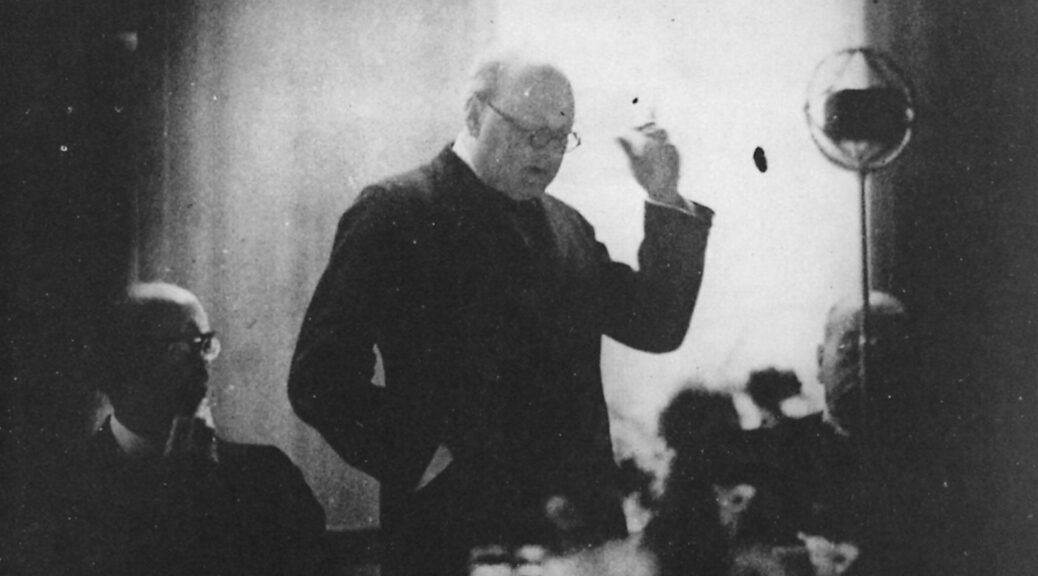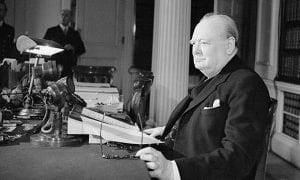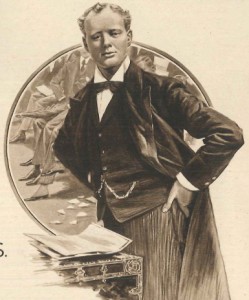
Speaker Jitters: Churchill Had Them, Necessitating Strategy
Excerpted from “Churchill as Speaker: Back-Up Scripts and Pre-speech Jitters,” written for the Hillsdale College Churchill Project. For the original article with endnotes and other images, click here. To subscribe to weekly articles from Hillsdale-Churchill, click here, scroll to bottom, and enter your email in the box “Stay in touch with us.” We never spam you and your identity remains a riddle wrapped in a mystery inside an enigma.
A note by Sir Martin Gilbert
In 1972 I was invited to tea with Prime Minister Edward Heath in the garden of 10 Downing Street. It was the first and only time I sat in that garden.
The Prime Minister was accompanied by his Political Secretary. At one point Heath asked me how Churchill prepared his speeches, how did his speechwriters work? I interrupted keenly to say that Churchill did not use speechwriters, but dictated all his own speeches, even on occasion writing them out in longhand.
As I spoke, I noticed the young man go somewhat red, and Heath look a little put out. I realized at once that I was in the presence not only of a prime minister but of a speechwriter. Twenty years later the young man, Douglas Hurd, was Foreign Secretary.
The Churchill method
If not Sir Edward Heath, most of his admirers know Sir Winston did not use speechwriters. We are sometimes asked: Did he speak from a written text? Was he afraid of speaking extempore?
One article declared that “even after giving hundreds of public speeches, WSC still admitted to “butterflies in the stomach” just before he was about to speak.
Soon the young Winston learned not to make a speech without a text handy. Early on, he would commit each oration to memory. But in April 1904, he lost his place in mid-speech and sat down embarrassed. To encourage him, he was cheered from both sides of the aisle.
Today’s politics are less collegial. Live television broadcasts, while shedding welcome light on the workings of government, encourage playing to the camera. A floundering speaker is not treated so courteously.
“When I ‘Dried Up’”
Churchill wrote of this disconcerting experience in a 1934 essay, “When I ‘Dried Up.’” He recalled with pleasure how colleagues offered him “the greatest patience and kindness.” Unfortunately, the essay was never reprinted—not even in the marvelous Collected Essays. A transcript is available electronically to any reader who cares to email [email protected].
After that experience, “disconcerting to the last degree,” Churchill was never a speaker without a text—typed out and triple spaced in “Speech Form,” as secretaries called it, the individual lines broken out and indented as he planned to recite them, like verses in a psalm.
“An hour of prep per minute of delivery”

Each speech was a product of great pains. The late Lord Soames, his Parliamentary Private Secretary in the early 1950s, explained how much trouble Churchill took:
It worked out to be an hour of preparation per minute of delivery, and it was nothing for him but hard work. Then came the skill of pretending, of looking as if it was coming off the top of his head.
He knew how to read without looking as if he wasn’t. In those days there wasn’t this lovely machine that we’ve all got now, which allows you to read your speech while looking around the hall. He had to look as if he was not reading—and sound as if he wasn’t.
Churchill was an excellent speaker because he loved the classics, which informed his composition. His vast sub-text was compiled through extensive reading, led by Shakespeare and the Bible. His capacious memory enabled him to fish up exactly the right quotation to bedizen his points. But it was all carefully rehearsed.
He was not a good ad libber, but often stowed away a good line for the right moment. One evening, after he had fired off a potent retort to some parliamentary critic, Lord Mountbatten asked him how he managed to come up with such devastating ripostes. “Patience, Dickie,” the great man smiled. “I’ve been waiting years to get that one off.”
Speaker jitters

By contrast, Sir Martin Gilbert needed no written text. He would often arrive with a sheaf of foolscap, each sheet bearing a scrawled line or two. Glancing at one, he would lay it aside, ad-lib flawlessly for ten minutes, take up another sheet and repeat the process. But Sir Martin was nervous before a speech. So was Churchill, according to Lord Soames:
Soon after Winston returned from the Boer War he went up to Liverpool, very much in the thick of things. An aspiring politician, he went to address an enormous gathering. He stayed with the Lord Derby of the day, Eddie Derby, and they rode in a carriage together the few miles into Liverpool.
Now Winston was very quiet, as nearly everyone is when they are brooding and have a speech awaiting. Lord Derby, who was nearly three times Winston’s age, turned to him and said, “Are you nervous, Winston?”
“Am I? Hell, I’m nervous as anything, I sure am,” Winston replied.
“Let me give you a tip,” said Lord Derby. “When I get up to make a speech, I look around the hall and I say to myself: ‘I’ve never in my life seen, gathered together in one room, so many bloody awful looking people!’ And then I go right off!”
If Winston Churchill ever told himself that about an audience before a speech, it was never evident.
Foreign pronunciation
Foreign languages were something with which Churchill notoriously struggled. Whether because he couldn’t get his tongue around them, or because he disdained proper pronunciation, he hardly ever tried to get them right.
Unlike modern newscasters and some politicians, he saw no reason to patronize foreigners by overemphasizing their pronunciation. In fact, he worked very hard to anglicize words that particularly annoyed him.
He frowned on name changes, like “Iran” for Persia or “Ankara” for Angora. In 1939 the Royal Navy cornered the German battleship Graf Spee off the Uruguayan capital—whose name Churchill studiously pronounced as “Monty-viddy-oh.” One wonders how he’d react to “Latine,” which Axios tells us is now the preferred gender-neutral way to refer to Latinos.
“Bad luck,” WSC declared in 1945, “always pursues people who change the name of their cities. Fortune is rightly malignant to those who break with the traditions and customs of the past.” Britons, he said, should stand forthrightly behind Anglicized nomenclature:
If we do not make a stand we shall in a few weeks be asked to call Leghorn Livorno, and the BBC will be pronouncing Paris “Paree.” Foreign names were made for Englishmen, not Englishmen for foreign names. I date this minute from St. George’s Day.
Churchill as speaker was devoid of faddish jargon. (Imagine what he would make of vernacular like “reaching out” (for “contacting”) or “issues” (for “problems”).
He looked diffidently upon the newspapers, although he wrote for many. Towards individual journalists he was magnanimous. “Do not be afraid to criticise, young man,” he once told an overawed editor, “I am a professional journalist.”6
Further reading
“Scaffolding Rhetoric: Churchill in Congress, 1941,” 2022.
“The Problem with Recorded Churchill Speeches,” 2022.






